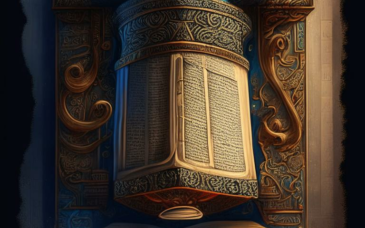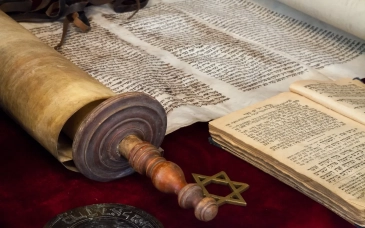Chapter Six
This chapter explains that it is forbidden to erase any of the Holy Names, and states which Names mat be erased.
1) Anyone who erases one of the holy and pure Names by which God is called is liable to flogging according to the Torah, for concerning idol - worship it is written, "...and destroy the name of them from that place. This you shall not do to the Lord your God".
2) The seven Names of God are: the Tetragrammaton, which is written as either Yud-Hey-Vav-Hey or Aleph-Daled-Nun-Yud [Lord], Aleph-Lamed [Almighty], Aleph-Lamed-Hey-Yud-Mem [God], Shin-Daled-Yud [Almighty], Tsadi-Vet-Aleph-Vav-Saf [Hosts] and Aleph-Hey-Yud-Hey [I am]. Anyone who erases even one letter of any of these Names is liable to flogging.
3) Any prefixes to any Name, such as a Lamed to form, `to the Lord', may be erased, because they are not holy. Any suffixes, such as a Chaf to form, `your God', may not be erased, because they are like the letters of the Name, which lend holiness to them. Even though these added letters are holy and may not be erased, anyone who does erase them is not liable to flogging according to the Torah, but is flogged because because of a Rabbinical decree.
4) If one wrote the Aleph and Lamed of `Elokim', or the Yud and Hey of the Tetragrammaton, one may not erase them, and it need not be said that the Name which is spelt Yud-Hey [Jah] itself may not be erased, firstly because it is a Name in its own right, and secondly because it is part of the Tetragrammaton. If, however, one wrote the Shin and Daled of `Shakai', or the Tsadi and Vet of `Tsvakot', one may erase them.
5) Attributes, such as Merciful and Graceful, with which God is praised are like miscellaneous holy words, and it is permitted to erase them.
6) Concerning a vessel on which a Name is written; the part on which the Name is written must be cut out and relegated to the archives [before the vessel may be used]. Even if the Name was engraved [and not written] in a metal or glass vessel, then one who melts the vessel is liable to flogging. To be allowed to use such a vessel one first has to remove that part on which the Name is engraved and relegate it to the archives. Similarly, if one had a Name written on one's flesh, one may not wash or apply ointments or creams [on that place], and one may not stand in a place which is soiled with excrement. If, for whatever reason by way of a mitzvah, one has to immerse oneself in a ritual bath, one must cover the place on which the Name is written with something that is waterproof before immersing oneself. If one could not find something that is waterproof, one should wrap a garment round [that part of one's skin] without sticking it, so that it won't act as a barrier between one's skin and the water. The only reason he has to wrap up the Name [in the first place] is that it is forbidden to stand naked in the presence of God's Name.
7) Anyone who removes, by way of destruction, even one stone from the Altar, the Holy Hall or any other part of the Temple Courtyard is liable to flogging, for concerning idol-worship it is written, "And you shall overthrow their altars...This you shall not do to the Lord your God". Similarly, anyone who, for destructive purposes, burns any sanctified wood is liable to flogging, for it is written, "...and burn their asherim with fire...This you shall not do to the Lord your God"2.
8) It is forbidden to burn any holy writings, or any translations of or commentaries on them. It is also forbidden to tear them up, any anyone who does so is flogged because of a Rabbinical decree. This is talking about holy writings written by a Jew in holiness, but if a Jewish heretic wrote a Sefer Torah, it must be burned along with the Names therein, for the reason that the heretic does not believe in the holiness of the Names, and does not write them with the correct intention , but treats them as ordinary literature. Since his attitudes are such his writings of [any of] God's Names are not holy, and it is a mitzvah to burn them, so as not to give any credence to heretics or to their actions. Any Names written by a gentile, however, are relegated to the archives, as are any holy writings which have become worn out or which were written by a gentile.
9) Any Names mentioned in connection with Abraham are holy. Even where it says, "...and said, `My Lord, if now I have found favour in Your eyes'", the Name there is holy. All Names mentioned in connection with Lot are not holy, with this exception: "And Lot said to them, `Oh, not so, my Lord: behold, your servant has found favour in your eyes...in saving my life". All the Names mentioned at the hills of Benjamin are holy. The Names mentioned with Michah are not holy. All the Names mentioned in connection with Navot are holy. All that Solomon wrote in the Song of Songs is holy and has the same status as the other Attributes, with this exception: "You, O Solomon, may have the thousand". Any mention of any king in the book of Daniel is not holy, with the exception of, "You, O king, king of kings", which has the status of other Attributes.

